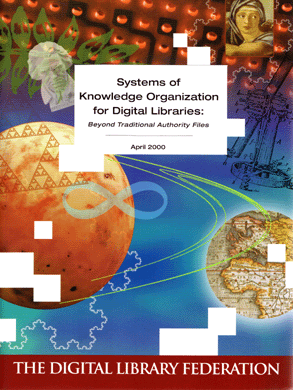Systems of Knowledge Organization for Digital Libraries:
Beyond Traditional Authority Files

by Gail Hodge
April 2000
Copyright 2000 by the Council on Library and Information Resources. No part of this publication may be reproduced or transcribed in any form without permission of the publisher. Requests for reproduction should be submitted to the Director of Communications at the Council on Library and Information Resources.
1. Knowledge Organization Systems: An Overview
- Common Characteristics of Knowledge Organization Systems
- Types of Knowledge Organization Systems
- Term Lists
- Classifications and Categories
- Relationship Lists
- The Origin and Use of Knowledge Organization Systems
- Abstracting and Indexing Services
- Publishers
- Trade, Professional, and Governmental Organizations
- Internal Projects
- Summary
2. Linking Digital Library Resources to Related Resources
- Expanding Codes to Full Text
- Linking Sequence Numbers to Biosequence Databanks
- Linking Individual Industrial Codes to the Full Scheme
- Linking to Descriptive Record
- Linking Organism Names to Taxonomic Records
- Linking Chemical Names to Molecular Structures
- Linking Personal Names to Biographical Information
- Linking Entity Names to Physical Specimens
- Summary
3. Making Resources Accessible to Other Communities
- Providing Alternate Subject Access
- Indexing the Material with Multiple Schemes
- Retaining Alternate Indexing from Contributions
- Mapping Multiple Schemes
- Adding New Modes of Understanding to the Digital Library
- Providing Multilingual Access
- Expanding Free-Text Search Terms
- Summary
4. Planning and Implementing Knowledge Organization Systems in Digital Libraries
- Planning Knowledge Organization Systems
- Analyzing User Needs
- Locating Knowledge Organization Systems
- Planning the Infrastructure
- Maintaining the Knowledge Organization System
- Presenting the Knowledge Organization System to the User
- Implementing Knowledge Organization Systems
- Acquisition and Intellectual Property Issues
- Making the Link
- Summary
5. The Future of Knowledge Organization Systems on the Web
6. Conclusion: Enhancing Digital Libraries with Knowledge Organization Systems
The Digital Library Federation
On May 1, 1995, 16 institutions created the Digital Library Federation (additional partners have since joined the original 16). The DLF partners have committed themselves to “bring together-from across the nation and beyond-digitized materials that will be made accessible to students, scholars, and citizens everywhere.” If they are to succeed in reaching their goals, all DLF participants realize that they must act quickly to build the infrastructure and the institutional capacity to sustain digital libraries. In support of DLF participants’ efforts to these ends, DLF launched this publication series in 1999 to highlight and disseminate critical work.
About the Author
Gail Hodge is a senior information specialist at Information International Associates, Inc. (IIa). She has worked in the information industry for more than 20 years, specializing in bibliographic database production systems, information systems planning and development, and standards. She conducts research on scientific information policy, technologies, and standards for the U.S. government and for international and commercial organizations. Recent projects include an analysis of the state-of-the-practice in digital archiving for the International Council for Scientific and Technical Information, and development of controlled vocabularies for the National Institute for Literacy, the Department of Energy’s Environmental Management Science Program, and the National Biological Information Infrastructure. Before joining IIa, Ms. Hodge held positions at the Drexel University Library, BIOSIS, and the NASA Center for AeroSpace Information.
Acknowledgments
I would like to thank the following individuals for their input to this report:
Stan Blum, California Academy of Science
Bonnie C. Carroll, Information International Associates, Inc.
Michael Dadd, General Manager, BIOSIS UK
Linda Hill, Alexandria Digital Library Project, University of
California at Santa Barbara
Ray Larson, University of California at Berkeley
Jessica Milstead, The JELEM Company
Douglas Yanega, Entomology Research Museum, University of California at Riverside
Foreword
Access to digital materials continues to be an issue of great significance in the development of digital libraries. The proliferation of information in the networked digital environment poses challenges as well as opportunities. The Digital Library Federation is committed to fostering work that addresses these challenges and opportunities while also ensuring the timely dissemination of information about state-of-the-art initiatives.
The author reports on a wide array of activities in the field. While this publication is not intended to be exhaustive, the reader will find, in a single work, an overview of systems of knowledge organization and pertinent examples of their application to digital materials. Technological developments have made it possible to provide alternate subject access through the adoption and use of multiple knowledge organization schemes. The report offers extensive practical information for institutions embarking on digital library initiatives. In particular, the section on planning and implementing organization systems identifies methods for enhancing access to existing digital materials.
Rebecca Graham
Research Associate

